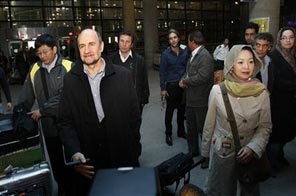Iran for changes in draft nuke plan
TEHRAN: State television said Tuesday that Iran will agree to the general framework of a U.N.-drafted plan to ship enriched uranium out of the country for processing, but will seek "important changes" in the deal that the West hopes will ease nuclear tensions with Tehran.
The report suggests that Iran will accept the idea of sending the material abroad — something it had previously appeared reluctant to do — but that there could be a tussle with the U.S. and Europe over details of the plan.
France's foreign minister was already expressing exasperation with Tehran, saying it is trying to have the proposal "thoroughly reworked." Bernard Kouchner said he doesn't think the plan needs dramatic changes and warned Iran, "It cannot take forever. We wait for answers."
The plan calls for Iran to ship 70 percent of its enriched uranium abroad for further enrichment. The U.S. and its allies back the deal because it would at least temporarily leave Iran's uranium stockpiles too low to build a nuclear weapon. Iran denies any intention to develop a bomb.
The report Tuesday on the state-run Arabic-language channel Al-Alam cited an unidentified official saying Iran will officially reply on the deal within 48 hours. The official said Iran "will agree to the general framework" of the plan "with a request for important changes."
It did not specify the amendments Iran will seek. Another Iranian state channel, Press TV, said Tuesday that Tehran is opposed to sending the entire shipment abroad at once, suggesting it wants to do it in stages.
Iran has also given hints that it may want to send less than the 70 percent of its stockpiles abroad. On Monday, Iranian Foreign Minister Manouchehr Mottaki said Iran might agree to "deliver part of (the low enriched uranium) fuel which we currently don't need."
Speaking in Luxembourg, France's Kouchner showed impatience with Iran, suggesting it was drawing out its reply on the deal. "We have been waiting for almost three year for the light at the end of the tunnel. And we still wait," he said.
The European Union's foreign policy chief, Javier Solana, who is also negotiating with the Iranians, said "the deal was a good deal and I don't think it requires fundamental changes."
In the enrichment process, uranium purified to a low level — 5 percent or below — is used as fuel for a nuclear reactor, and to a somewhat higher level — around 20 percent — it can power a research reactor. The United States and its allies fear Iran secretly intends to further enrich its low-enriched uranium to more than 90 percent purity, the level needed to build a bomb. Iran contends its program is intended only to generate electricity.
Around 2,200 pounds (1,000 kilograms) of low-enriched uranium is needed to produce enough weapons-grade uranium for a single nuclear warhead, according to experts. Iran is believed to have well over that amount of low-enriched uranium in its stockpiles.
The U.N. plan would require Iran to send 2,420 pounds (1,100 kilograms) to Russia in one batch by the end of the year to be enriched enough for a Tehran research reactor.






